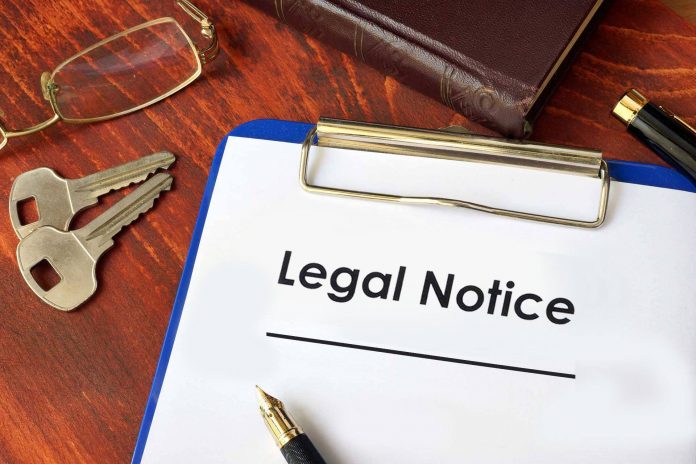This article is written by Vanya Verma pursuing B.B.A.LL.B. (Hons.) from Alliance University, Bangalore. This is an exhaustive article which deals with a legal notice, it’s objective, benefits, how to reply to the legal notice and what all things should be kept in mind while replying to a legal notice, cases in which a legal notice is served and how to reply to a legal notice.
Table of Contents
Introduction
All the legal actions can be started once the legal notice is served to the entity or to the individual. The process of legal notice legalises the matters to be brought before the Court of law. The intimation sent is known as the legal notice.
What is Legal Notice?
A legal notice is basically a legal intimation that is sent to the opponent, it indicates that the aggrieved is preparing a lawsuit to be filed against the concern, in the case the demand that is mentioned in the notice does not get fulfilled.
Therefore, a legal notice can be defined as a formal communication to any legal entity or to a person, informing the other party about the intention of undertaking legal proceedings against them.
Legal Notice in India is considered to be the first step in a legal proceeding.
When a legal notice is sent, it conveys the intention prior to the legal proceedings, thus, making the other party aware of grievance.
It is important to note that a legal notice is not sent in criminal cases but only in civil cases under Section 80 of The Code of Civil Procedure, 1908.
The objective of Legal Notice
The basic objective of a legal notice is to display the intention of the party to initiate the legal proceedings. The legal notice serves the purpose of giving an opportunity to the opposite party to reconsider his legal position and to make amendments or afford restitution without proceeding to a Court of Law. It was stated by the Supreme Court that “The object of this section is the advancement of justice and securing of public good by avoidance of unnecessary litigation.”
The legal notice is deemed to be served only when the addressee receives or refuses to accept the notice, and not by simply posting the notice. This serves as evidence as to receipt of the notice. Through a legal notice, one can demand from the other party to accede to his request otherwise he will initiate legal action.
The notice helps to settle the disputes outside the Court. Majority of matters settle before the trial commences. The notice gives the opportunity to the opposite party to rethink or reconsider their stance. To avoid a legal dispute the parties can take necessary actions if in their opinion the case can be settled. The parties can settle the matter through negotiation, mediation or arbitration.
Reply to a legal notice
The legal notice should be replied within the stipulated time, if not replied within the stipulated time it can prove to be beneficial to the addressee.
After receiving the notice the following points must be kept in mind:
- Carefully reading the legal notice– It is important to properly read the notice to understand the issue and concerns that are raised by the other party. If the receiver of the legal notice feels that the concerns raised in the legal notice could be resolved amicably then immediately a conversation should be initiated.
- Contacting the Lawyer– If the contents of the legal notice are not clear, then a profound lawyer must be contacted who can further legal action in the matter. Also, the receiver should keep a record of the time of receiving the legal notice which will be advantageous even if the matter is taken to the Court by the opposite party.
- Briefing the lawyer– This step must be done carefully, the entire matter must be escalated to the appointed lawyer. The lawyer must be provided with all the necessary information about the facts, time, place, events etc that are related to the issue, this helps the lawyer to draft a proper reply that represents the receiver’s side of an argument.
- Sending the reply– The reply notice is sent either through a registered notice or courier, once the lawyer drafts the reply notice on your behalf. The lawyer keeps the copy of the reply notice for future reference.
What happens if the person doesn’t respond to a Legal Notice?
If the person to whom the notice is sent, doesn’t respond to it in a stipulated time, then the aggrieved party files a suit in the appropriate Court of Law. Once the suit is filed in the court, the order will be sent to the respondent by the Court to appear before the court and to answer the charges pressed against them by the opposite party.
Benefits of a Legal Notice
The Legal Notice has the following benefits:
- Warning– A legal notice acts as a warning against the offender as it ensures that the offender is aware of the duties that have to be performed by him otherwise face the consequences of non-compliance.
- Resolution of dispute– A fair chance is given to both the parties to resolve their dispute, that can be through negotiation, mediation or arbitration without dragging the matter before the Court.
- Amicable settlement– The litigation process is time and money consuming, thus, it is preferable to directly settle the matter via the legal notice, that is much easier and a quick process.
Legal notice must mention the following points
- Name and address of the parties– The legal notice must mention the name and address of the party to whom the legal notice has to be sent.
- Facts and grievances– The facts and grievances caused to the sender must be mentioned in the legal notice sent by the sender in paragraphs and points.
- Compensation– After stating the facts, the legal notice must mention the amount of compensation if any, claimed for the inconvenience caused. Sometimes the legal notice mentions an alternative mode of redressing the dispute. It is mandatory to mention the laws under which the compensation is claimed.
- Signature– At the end of the legal notice, there should be a signature and stamp of the lawyer who sends the legal notice on behalf of the client.
The procedure of sending a legal notice
- You can either draft a legal notice yourself or you can take the lawyer’s assistance. Though, it is advisable to engage a qualified lawyer, as one should be extremely cautious with the language used and the choice of words. While drafting a legal notice, you should be cautious of using any fact that might later work against you in the court. Once a legal notice is sent, it cannot be changed and if you use any contradictory statement in the court, then it might weaken your case.
- The legal notice must be addressed to the person against whom you have grievances.
- A legal notice must be sent on a plain paper or on the letterhead of a lawyer.
- You must categorically mention in the legal notice the time period in which the addressee must respond to the notice, the time period can be 30 to 60 days. The time period must be stipulated within which the other party is expected to fulfil the demands.
- The legal notice should be signed by the lawyer as well as the sender.
- The legal notice must be sent either through a registered post or courier. It is advisable to ensure that the acknowledgement is retained.
Cases in which legal notice is served
The legal notice is mostly served in following cases:
- Notice by an employer– Notice can be for violation of HR policies, leaving job without resignation letter, committing sexual harassment at the workplace, violation of employment agreement provisions etc.
- Notice by an employee– Notice can be for wrongfully terminating the employees, violation of the employer’s rights, unpaid salary etc.
- Property disputes– Property disputes involve disputes regarding mortgage, the partition of family property, eviction of the tenant on unreasonable grounds etc.
- Consumer complaints– Notice can be served to the company who is manufacturing contaminated or low standard products, negligent service, fraudulent advertisement etc.
- Breach of Contract– Notice is served if the other party fails to comply with the provisions of a contract, or fails to fulfil the agreement in the contract
- Recovery of Money– Notice is served to the debtor to recover money after the lapse of time.
- Cheque Bounce– Notice is served to the issuer of cheque in case of cheque bounce.
- Personal conflict– Notice can be conflicts regarding divorce, child custody, maintenance, division of maternal property etc.
The formats for all the above mentioned legal notices are the same. Mostly notice is sent through a registered post but it can also be delivered in person. Recently there is a trend of sending a legal notice through online means, it has the same effect as that of a notice sent through a post or delivered in person.
Common mistakes while replying to a legal notice
- Time: The most common mistake is not replying to a legal notice on time. The sender should try to reply to the notice as soon as possible and within the stipulated time as mentioned in the sender’s notice. Otherwise, the sender can take strict actions.
- Reply: The mistake the party makes is that they do not reply in a proper and prescribed manner. The notice should be properly replied, if the party is unable to understand the terms of the notice, a professional advocate should be consulted.
- Sections: The mistake that is made is that the party forgets to mention the sections under which it is sending the notice. It is important that the party should be aware of the relevant sections under which it is sending the notice.
- Date: The people forget to mention the date in the notice. It is very important to mention a date in the notice.
- Sign: If the party consults an advocate then it should not forget that both the party’s and an advocate’s signature is required.
- Address: The present address of the sender should be mentioned so that it reaches to the proper person in proper time. Causing delay might act against the party later.
- Contact: The sender’s present working phone number should be addressed.
Tips to provide a proper response
What to do when one receives a legal notice:
- The first thing to do after receiving a legal notice is to call the sender of the notice with the aim to resolve the dispute amicably.
- Though it is not mandatory to reply to a legal notice but still it is advisable to send an appropriate reply to the legal notice.
- If in case one fails to send a reply to a legal notice, the other party may use that as an advantage and while drafting the petition, they may blame for not adhering to the requirements of the notice, for which reason the case has been filed.
- If in one’s opinion the facts that have been stated in a legal notice are not true and he needs to contest a legal notice, then he can take consultation from an experienced lawyer, seek his assistance and draft a proper reply to the legal notice, denying the contents stated in the legal notice. The legal notice must be sent via registered post or courier.
- While sending a reply to the legal notice, check whether the claim in the legal notice is time-barred or not. If the claim is time-barred then one should only reply that the claim is not within the limitation period.
Sample:
Notice under Negotiable Instruments Act, 1881 regarding dishonour of cheque
To,
Sh.(Name & Address)
________________
Sub:- Notice under Section 138 of the Negotiable Instruments Act for Dishonour of cheque due to insufficient funds.
Respected Sir,
Under instructions and authority from our client M/s. ________ having their office at _________, we serve upon you the following notice of demand under Section 138 of the Negotiable Instruments Act.
That your business concern M/s _______ had purchased from my client goods (Name and brief description of goods) vide their invoice bearing no. ___ dated ________ for Rs._______
On delivery of goods above mentioned, you issued a cheque bearing no. ____ dated _________ for Rs._______drawn on ____ Bank.
That when the aforesaid cheque was presented by our client M/s. ____ to your Bankers i.e. ________ the same was returned unpaid by the Bank with the remarks/reasons “Insufficient Funds”. This fact was brought to your notice by our client vide letter dated_______.
That in reply to our client’s letter, you sent a letter dated ____ requesting him to deposit the cheque again with a banker and assured him that they will be cleared this time.
My client again presented your above-mentioned cheque with its bankers, this time again the cheque was returned unpaid by the bank due to insufficient funds.
That thereafter in spite of many telephonic reminders and personal visits by the representative of our client to your office, you failed to make the payment due to our client.
That on account of the above facts, you are liable to be prosecuted under section 138 of the Negotiable Instrument Act, 1881 as amended up to date under which you are liable to be punished with imprisonment which may extend to one year or with fine which may extend to twice the amount of cheque or with both.
Under the circumstances, we call upon you to make the payment of Rs. _____ being the principal amount of the aforesaid cheque along with interest @ ____ % per annum till the time of actual payment within a period of 15 (fifteen) days from the date of receipt of this notice, failing which we will be bound to take further necessary action under the provisions of Negotiable Instrument Act, 1881 against you in the competent court of law at your risk and cost.
This is without prejudice to all other legal rights and remedies available to our client for the above-stated purpose.
Kindly take notice.
Date:____________
Yours faithfully,
____________
Notice by Vendor to complete the purchase of immovable property
Advocate
________________
Date ________________
To,
________________
________________
Re: Sale of House No. _______ situated at ____________________.
Respected Sir,
Under instructions of my client Shri ____________ s/o _______________ r/o ________________.
It is stated as follows:
My client had entered into an agreement for sale dated ___________ with you for sale of house No. ________________, situated at _____________. for a consideration of Rs. _______ and in terms of clause ___________ of the said Agreement, the said transaction is to be completed within _____ months from the date of the said agreement.
My client was and is still willing and ready to execute a sale deed in your favor or in favor of any person as you may direct in accordance with the terms of the said agreement, but the same was not done for reasons of your own.
I hereby call upon you to have the deed of conveyance executed by my client against payment of the balance of the consideration money on or before the ______ day of ____________ in terms of the said agreement, failing which the said agreement will stand cancelled and the earnest money paid by you will stand forfeited.
However, this is without prejudice to the rights of my client to recover all costs, damages, losses, and expenses incurred by him by reason of your default in performing the said agreement.
Yours faithfully,
____________
Conclusion
It is common to receive legal notice these days because of so many contracts and agreements. But what is important is to thoroughly go through legal notice and take a wise decision yourself and if you are unable to do so then a profound lawyer must be contacted. A prompt reply should be given and efforts should be made to settle the matter through negotiation, arbitration or mediation rather than dragging the matter to the Court which requires much more effort, time and money.
References
- https://legalserviceindia.com/legal/article-162-things-you-need-to-know-about-sending-a-legal-notice-.html
- https://www.legistify.com/blogs/view_detail/315-do-not-panic-just-when-you-receive-a-legal-notice-this-is-the-procedure-to-follow/
- https://vakilsearch-com.cdn.ampproject.org/v/s/vakilsearch.com/advice/legal-notice-format/amp/?amp_js_v=a3&_gsa=1&usqp=mq331AQFKAGwASA%3D#aoh=15865597922553&referrer=https%3A%2F%2Fwww.google.com&_tf=From%20%251%24s&share=https%3A%2F%2Fvakilsearch.com%2Fadvice%2Flegal-notice-format%2F
- https://onlinelegalindia.com/services/legal-notice/?gclid=CjwKCAjwssD0BRBIEiwA-JP5rG39DhbFMl9q0rGeZ9epFDl0appsWDjuYbHDV2GCLpTXzZN13okCbRoC6aAQAvD_BwE
- https://www.taxolawgy.com/reply-to-legal-notice/
LawSikho has created a telegram group for exchanging legal knowledge, referrals and various opportunities. You can click on this link and join:
 Serato DJ Crack 2025Serato DJ PRO Crack
Serato DJ Crack 2025Serato DJ PRO Crack










 Allow notifications
Allow notifications


